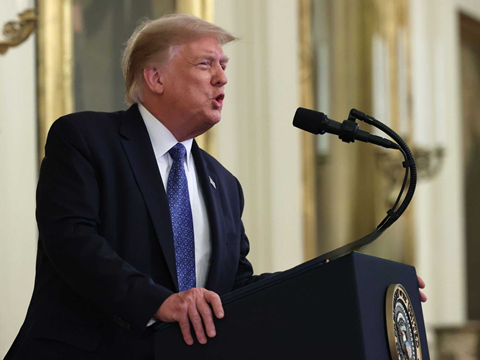
Donald Trump is overriding plans to phase out single-use plastics across the US federal government in retaliation to paper straws – but his “back to plastic” approach will exacerbate pollution and fails to consider alternative materials, critics claim.
Last summer, in what was considered the first instance of the federal government formally acknowledging the scale of the plastic waste crisis, the Biden-Harris Administration released a report in which it planned to eliminate single-use plastics across America’s federal government agencies by 2035.
Shortly after his re-election, Trump rescinded Secretary’s Order 3407 (SO 3407), introduced by Joe Biden in an effort to phase out single-use plastics on federal lands – which include national parks, military reserves, national forests, and areas of wilderness, among others – by 2032. The measure originally encompassed such plastics as straws, bottles, cups, and food and beverage packaging.
Now Trump has shared a Truth Social post announcing his intent to sign an executive order and reverse “the ridiculous Biden push for paper straws, which don’t work. BACK TO PLASTIC!”
In a follow-up post, he added: “Enjoy your next drink without a straw that disgustingly dissolves in your mouth!!!”
Some consumers are relieved by the decision, expressing their frustration with paper straws that are distributed in plastic wrappers, degrade in beverages, and leave behind an unpleasant aftertaste. In one person’s view, paper straws are ‘loaded with carcinogens’, which might allude to various studies that have identified PFAS in paper and plant-based straws.
“I bet we are wasting more energy and water now than when we had plastic straws,” one user speculated, complaining that paper straws would ruin laundry cycles after entering the washer and dryer in her children’s pockets. Other users fired back at the latter complaint, suggesting that she should take personal responsibility for keeping paper out of wash cycles rather than rewrite legislation to prevent it.
Thanks for reversing that decision! I can’t tell you how many times I have found paper straws in the pockets of my three teenage boys while doing laundry. They mess up washer/dryer resulting in rewash. I bet we are wasting more energy and water now than when we had plastic straws
— N Kamal (@JahandarKhatoon) February 7, 2025
Multiple commenters urged the president to apply the same sentiment to plastic bags, frustrated with the inconvenience of asking for a bag and paying levies to use them.
Not everyone was on board, however. Critics of the executive order pointed to studies finding microplastics in human brains, hearts, blood, breast milk, and urine, among other body parts. Reverting back to plastic straws is feared to have negative impacts on humans, animals, and the planet alike.
“Paper straws are just fine and plastic kills birds and fish,” one user argued. “I’m no environmentalist, but [I’ve] seen too many birds dying with plastic straws caught in their throats.”
“Paper straws are higher quality and better drinking experience,” another added. “It’s like wooden chopsticks – it adds its own unique flavour to the meal.
“It does get wet, but you’ll be done already by then, no prob[lem].”
paper straws are higher quality and better drinking experience. trump has good intentions but the paper straw is a superior product its like wooden chopsticks it adds its own unique flavor to the meal because the wood it does get wet but youll be done already by then no prob
— puggerino546 (@puggerino546) February 7, 2025
Other consumers did not approve of either solution, objecting to plastic’s environmental impact while expressing dissatisfaction with the performance of paper straws.
“Is there anything that works better than paper but [is] less harmful than plastic?” another user despaired. “Why are these our only two options?”
This group’s view is that other materials would better fit the bill, with hemp raised as a suggestion to benefit local farmers. Bamboo is also said to be renewable, biodegradable, and “[emulate] plastic in feel and flexibility”.
“Metal straws are great,” somebody else suggested, describing them as “reusable, classier, less toxic, better for the environment and more beautiful”. Some are opposed to the expensiveness of this solution, although it is argued that metal straws can be kept and reused for years, making an initial investment more cost-effective than repeat purchases of less durable solutions.
Such alternatives are also described as inaccessible to disabled consumers “due to their inherent rigidity” – and, as has been pointed out in opposition to strict bans on plastic straws, metals can pose safety risks when conducting heat and cold.
The latest Trump presidency has given rise to various concerns among the packaging industry. Our very own Tim Sykes has discussed the potential impact of Trump’s protectionist policies on global trade, especially America’s domestic recycling industry, as well as his emphasis on stimulating the American market rather than participating in global climate initiatives.
Charles Haverfield, CEO of US Packaging & Wrapping, has also questioned whether the incoming tariffs on imports could create new opportunities for the packaging industry in the United States, including a rise in locally sourced, more environmentally friendly materials and a transition into closed-loop recycling.
Meanwhile in Europe, Capri Sun Group previously caused controversy when it petitioned the European Commission to let it re-introduce plastic straws and create a mono-material, fully recyclable pack. This came after Capri Sun embraced paper straws back in 2021 and claimed to enhance the strength of its paper straws as recently as January 2024, but such developments reportedly failed to appeal to consumers, who complained about the paper straws’ performance.
If you liked this story, you might also enjoy:
Reuse vs. single use – which is better for the environment?
Sustainable Innovation Report 2025: Current trends and future priorities
What can the world learn from South Korea’s world-leading performance in plastics circularity?













No comments yet